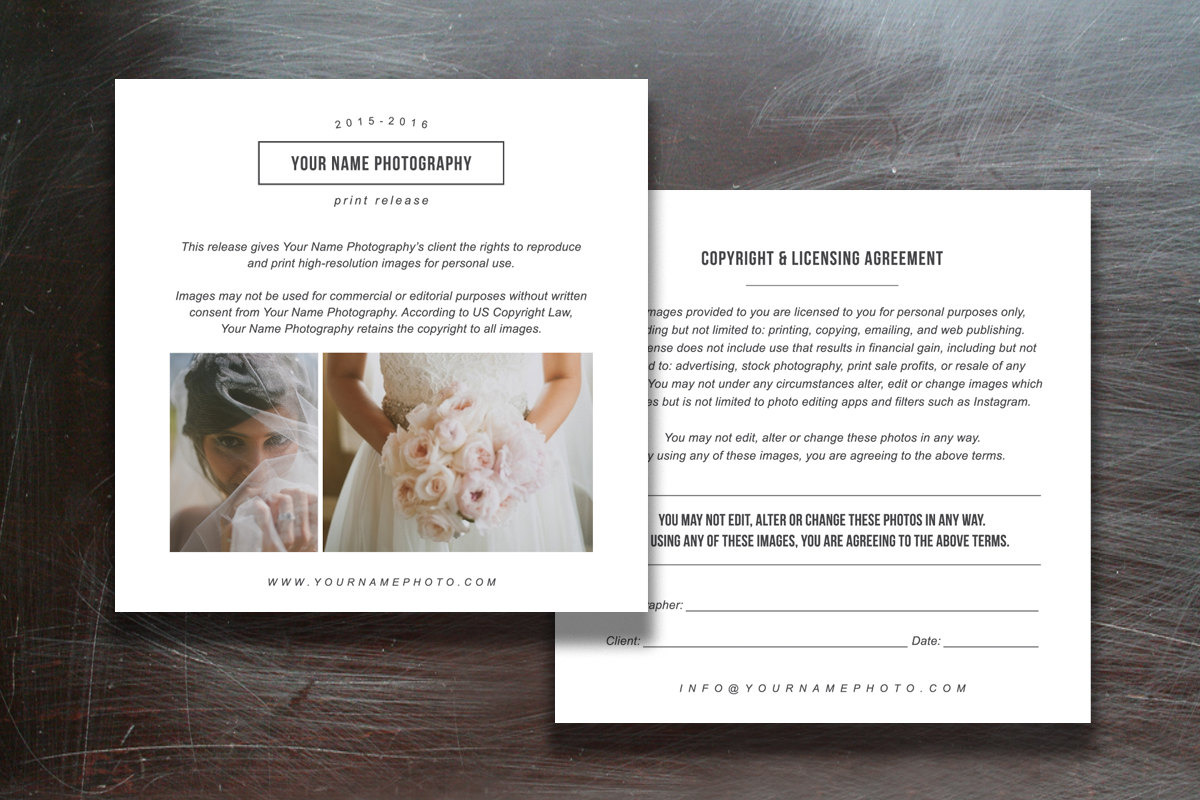- Home
- Services
- Portrait Retouching Services
- Wedding Photo Editing Services
- Color Correction Services
- Glamour Retouching Services
- Photo Retouching Services
- High End Photo Retouching Services
- Background Removal Services
- Photo Correction Services
- Photo Post Processing Services
- Photo Enhancement Services
- Photo Post Production Services
- Photo Culling Services
- Pricing
- Portfolio
- Shop
- Blog
- Login
How to Make Photography Contract Template: Tips & Tools
-
Juli Allen
-
October 6, 2023

If you want to safeguard your customers against copyright, payment or expectations issues, photography contracts for clients are the best solution. You can draft a detailed document before a photoshoot of a wedding, birthday celebration, political or other events. The signed contract becomes legally mandatory.
Why Do You Need a Photography Contract for Clients?

The contract is your sure way to protect your right to use and distribute photos, as well as stay aside from payment disputes and liability issues. Moreover, this can calm down the clients, as such a document is a guarantee that you’ll fulfill the conditions of the agreement.
It helps put expectations into writing. For instance, a basic photography contract should describe when, where the photoshoot will take place. It should also contain payment details. In the document, a client needs to claim whether he or she wants to get photos in soft or print copy. These details are often not discussed at the meeting with a client.
Regulation of all possible problems. For instance, the document can regulate such issues as payment deferral for several months or change the venue or scope of work all of a sudden. In such cases, the contract is a reference point for solving such problems.
Shows your professionalism. Having an agreement on hand, a customer can be certain that a shooter knows how to do his work right.
It protects the client. If a photographer demands an advance payment, the contract will serve as affirmation that the money is in safety.
What to Include in Photography Contract

The most convenient way is to use a photography contract template to make certain that no details are missed. The contract should consist of the following points:
Names. Names and contact info are the indispensable part of any document. Provide the name of your company, contact details like postal address, physical address, telephone contact
and email address.
Date. In this section, you should indicate the date when the contract was signed and the time a photoshoot is planned to happen.
Venue. This section describes the shooting location and travel arrangements in case this place is distant.
Deliverables. This part of the contract covers all the services a photographer is going to provide. First, tell a customer when and what exactly a customer gets after a photo session. Mention the genre of a photoshoot and let a person know whether you provide photo retouching services.
If you are going to shoot an event, specify the number of photos you plan to take. Besides, it is advisable to name all the people you’ll shoot. For instance, when conducting a wedding photo session, it is necessary to indicate how many photos you’ll devote to the bride, bride and groom, best friends, parents, etc.
Delivery format. Based on the client’s wishes, the photos can be delivered in different formats. For example, the handiest ways to share the pics are via email, by uploading them to cloud or social media. The result can be delivered as print copies, using photo galleries, or photo websites.
Payment. Of course, the variety of payment methods you are satisfied with can be extensive, but it is important to limit each client with one of them to avoid misunderstandings. If the withdrawal or transaction fees are applied, do not forget to include them.
Besides, settle on the payment conditions: whether you want to get money upfront, after delivery, 30 days, or one week. And do not forget to come to an arrangement about the payment methods such as invoice, payment template, receipts, etc. Most shooters accept wire transfers, cash, checks, online payments, or credit cards.

Copyrights. Here it necessary to discuss any issues related to copyright. Indicate the point at which the client gets the photography copyright. You can provide the right to advertise, publish on the wedding photography websites, print in magazines images on a permanent or fixed basis.
Model release. This is a contract used in photography as an agreement between a model and the photographer. It tells how and where the images can be used and the basis of any renumeration. In case any dispute happens, this document will regulate any of them. It is quite effective provided the parties stick with its conditions.
Cancellation. This is one of the most important sections of any photo contract template. A client should know the terms for contract cancellation. Here you should state whether the upfront payment will be returned, whether it will be a full or partial refund. Indicate all the possible cancellation scenarios, which are suitable for both a photographer and a model.
In case a client decides to cancel or postpone a photoshoot, he/she is free to ask for their deposit and know the time frame within which it is due to be paid back.
If a photographer needs to cancel or postpone a photo session, a client is eligible to hire another photographer and get his/her deposit back. In case of rescheduling, a client should decide whether the other day is ok or it is necessary to start looking for an alternative.
Confidentiality. The option to ensure that the client’s confidential info will remain unclosed is of paramount importance. This concerns such data as customer lists, trade secrets, products, business plans, financial statements, and manufacturing processes. This point comes up when a photographer organizes a photoshoot for business clients to promote marketing materials or other business assets.
Signature blocks. Each page of the document should contain a signature block.
Additional Terms for Different Situations
Exclusive Photographer. An “exclusive photographer” provision means that a hired photographer is a single person who can shoot the event. So, the other person trying to capture the celebration should put down the camera without a dispute.
Rescheduling Policy. If the event is postponed, a photographer may agree to return the advance payment provided he has another order for the original date.
Harassment Policy. This section claims that if a guest of the wedding or event treats the photographer inappropriately, the contract will be terminated.
Popular Contracts for Photographers
A commercial photography contract is the regulation of the relationships between a photographer and a commercial business. It should contain specific legal forms like an image licensing agreement. This type of a contract is a perfect fee for for brand, product, food, and architecture photoshoots.

A portrait photography contract should contain the terms and conditions of the photo session. It is designed to regulate copyright disputes, image usage, and payment issues. This type of document is perfect for family portraits, model shots, etc. In the lower part of the template, you can embed a QR code. Thus, potential clients can instantly access your portfolio or social network profile via QR code.
A model release photography contract allows a photographer as a business owner to use the images featuring a model anyhow you want. You are free to include photos to your portfolio, add them to your marketing materials, or share them on social media platforms. You cannot do without this type of document anytime you photograph people.
An event photography contract template is a type of agreement you should conclude whenever shooting large celebrations. This document often comes with photography release forms to help you get the allowance to publish the images or use them as you like. It works well for any type of event like anniversary celebration, a birthday, and a graduation party.

Like many other photography contract examples, a wedding photography contract covers the basic terms and conditions to regulate your cooperation with a client. There are sections devoted to cancellation policy, refund policy, start and stop times for the session, payment requirements, and final deliverables.
Where Can I Find Photography Contracts Templates?
TemplateLab. This website contains free contracts, agreements, letter templates and high-quality and stunning graphics that you can download in a flash. It boasts an extensive library of templates (31,271 in total). You only need to choose the category and the desired variant.

Lightfolio. On this platform, there are ten ready-to-use photography contract templates, which are a great starting point. Customize the required details and send the edited contract to your client, asking him/her to fill in the necessary fields. They have templates for different genres of photography – from portrait to real estate.
Lawtog. This is an excellent website that contains tons of examples of photography contracts, which are categorized based on genres, needs, and countries. All these easy-to-complete contracts were created by real experts: from TheLawTog + photographer team.
Template.net. The service has everything you need to sign contracts with the clients. Any type of small business, from photographers to maintenance to IT, can benefit from this resource. Each template is easy to edit, sign, or customize to suit your corporate style.

HoneyBook. This collection of templates is ideal for selling your services, inducing clients to order, and making your clientflow as simple as possible. Choose the template, asjust it to your needs, and get the shareable link in a jiffy. Clients should click on the link to open the document and sign it.
As a rule, such services do not only offer ready-to-use templates but also allow you to personalize them as you need. It is possible to change the background or alter the text color a lign with your brand colors, etc. Besides, you are free to add you own photos that reflect your unique style and professionalism to the banner instead of some stock images. Moreover, inserting a logo into your contract is a great way to personalize your document giving it a final touch.
FAQ
- Is it always necessary to make a photography contract?
Photography contracts for clients are of paramount importance, even if you are hired by close friends and relatives. The benefits of such documents are hard to enumerate:
- The photographer and client are well aware of their responsibilities
- Clear conditions for compensation
- Specifies the time the photo session will last
- Ultimately, if you decide not to use the contract, neither you nor you client won’t be able to enjoy all the benefits it provides.
- How do I write a photography contract?
When writing such an agreement, it is necessary to include all the important details about your cooperation. The essential sections of every contract are name and address, photographer details, and agreed dates and times. Besides, do not forget to describe payment terms, cancellation policy, image rights, and liability limitations.
- How much should a photographer charge?
The photographers specialize in different types of photoshoots like family portraits, modeling shoots, wedding events, etc. How to price photography depends on the experience and professionalism of a shooter. Besides, standard photographers charge their clients less than those who specialize in capturing such events as weddings or graduations.
BLS states that an average photographer earns $38,950/yr or $18.73/hr, whereas a wedding photographer gets from $1,150 to $3,000/event (source: WeddingWire.com).
- What if the client doesn’t like the photos?
This point also needs to be stated in the agreement. There are several solutions to this problem a complimentary photo shooting or a discount.
- Are photography contracts legally binding?
If both parties sign a contract and get a copy of it, this document is considered legally binding. Similar to an employment contract, a photography contract determines the terms and conditions of work that should be performed.
- Weedit.Photos Blog
- Inspiration for Photographers
- How to Make Photography Contract Template: Tips & Tools





